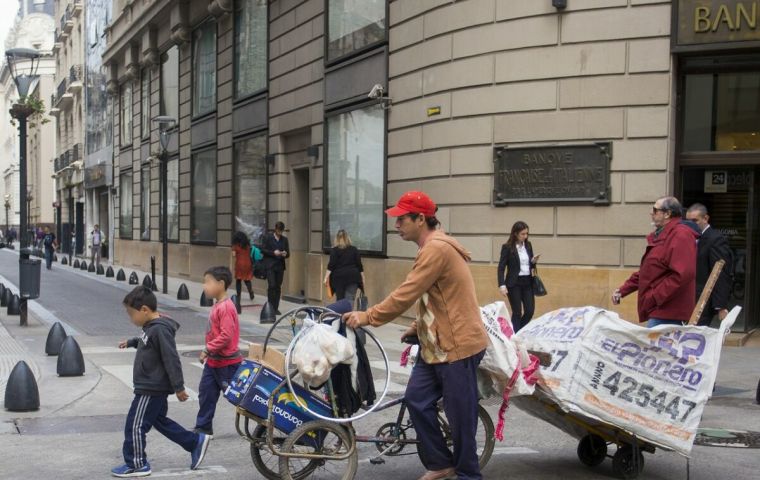MercoPress. South Atlantic News Agency
Inflation in Argentina hits working-class neighborhoods harder
 Lettuce went up 178.57% in July
Lettuce went up 178.57% in July According to a report by the Institute of Social, and Economic Research (Isepci) released Tuesday, inflation in suburban Buenos Aires where most working-class people reside, reached 11% in July, which is tantamount to saying it was 5 percentage points above the country's 6% average as per National Institute of Statistics and Census (Indec) figures.
“It is necessary to urgently stop the inflationary impulse,” Isepci's document highlighted after revealing that a typical family, composed of two adults and two children, needed AR$ 50,411.85 (around US$ 178, at the unofficial exchange rate) to avoid falling below the indigence line, when the minimum wage of AR$ 47,850 was not enough to cover the basic food basket after housing and other expenses were taken care of.
Isepci surveys every month a basket of 57 products in 900 local stores throughout 20 districts in the Buenos Aires suburbs.
Fruits and vegetables went up 17.47% for a total of 74.57% in the first seven months of the year. Groceries in general increased 14.53% in one month for a total of 64.53% and meat went up 3.81% and for an accumulated 43.81%.
”It is necessary to stop the inflationary impulse (which is motivated by multiple causes difficult to address simultaneously), but this objective cannot be sought by slowing down economic activity and shrinking the fiscal deficit by reducing State spending,“ the report stressed.
”The deficit in the public accounts must be reduced by increasing tax collection, imposing more tax contributions to the economic sectors that have been increasing their already huge profits,” the document went on.
The survey also showed that a typical family needed AR$ 112,922.54 (US$ 383) to cover its Total Basic Food Basket (also known as CBT for its acronym in Spanish), which meant an 11% monthly increase. The CBT includes essential products in addition to food, such as transportation, health, education, home maintenance, utilities, fuel, and clothing among other items, to avoid falling below the poverty line. If both adults in the family earned a minimum wage, they would still not meet that standard.
In Buenos Aires working-class suburbs, onion went up 183.33%, lettuce 178.57%, carrot 122.22%, sugar and chard 116.67%, bread 93.33%, crackers 90.67%, wheat flour 85.71%, chicken 84.62%; backbone 78.57%; buttock 73.33%; roast 71.64%, and minced meat 70%.
Amid this scenario, Superminister Sergio Massa and his team are to start talks Wednesday with businessmen in the food business to address the problem after July's inflation was the highest in the last 20 years, and it was not slowing down in August.
Economic authorities are also to discuss inflation with pharmaceutical companies after sharp increases in the price of medicines, it was reported in Buenos Aires media.




Top Comments
Disclaimer & comment rulesCommenting for this story is now closed.
If you have a Facebook account, become a fan and comment on our Facebook Page!